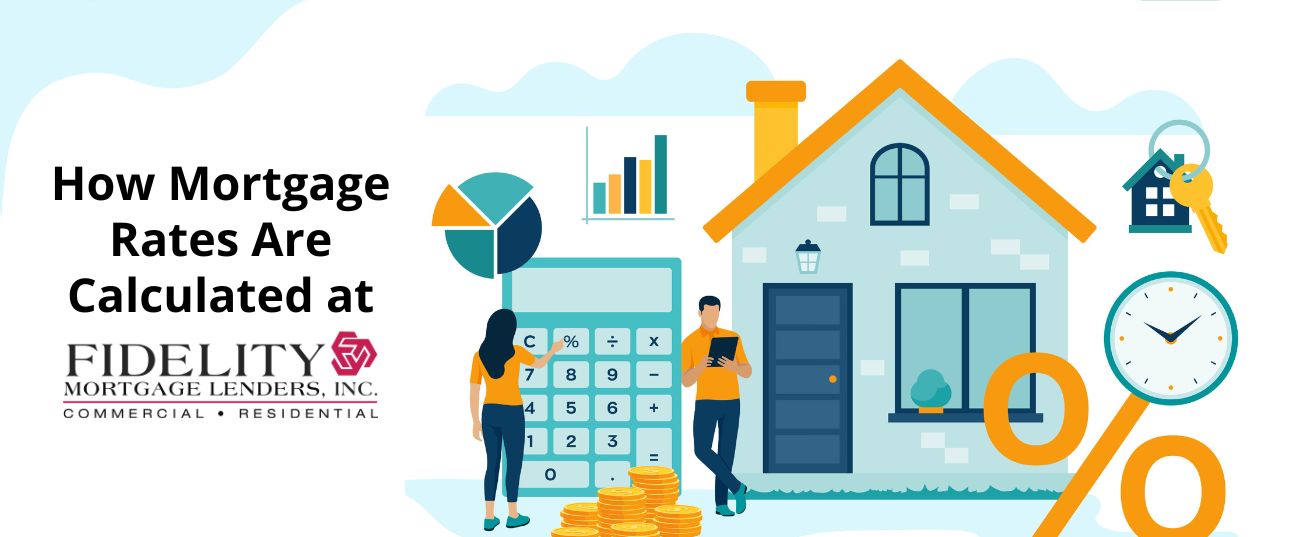When estimating your mortgage rate to calculate the possible cost of a real estate loan, there are multiple factors to keep in mind. The market itself, including the state of the economy, and personal factors like your credit score play a significant role. Read on to learn more about how we determine mortgage rates at Fidelity Mortgage Lenders.
Factors That Determine Mortgage Rates
- Mortgage bonds: Poor performance of the stock market usually triggers an increase in demand for mortgage bonds, causing mortgage rates to decrease.
- The economy: Mortgage rates tend to go up when the economy is doing well, and investors are moving their money from bonds to stocks for a better profit.
- Inflation: Inflation means that the value of the dollar is decreasing, which causes mortgage interest rates to increase.
- Your credit score: A good score boosts your creditworthiness as it shows mortgage lenders that you’re less likely to default. When you’re a lower-risk borrower, you’ll often get a lower interest rate on your mortgage.
- Down payment: At Fidelity Mortgage Lenders, we’ll always consider your down payment when calculating your mortgage rate. The more you pay upfront, the lower the risk for us, which can qualify you for a lower mortgage rate.
- Occupancy: You’ll get the lowest rate possible purchasing a primary property. You’d pay more interest on a vacation home and even more on an investment property.
- Loan-to-value (LTV) ratio: Your equity on the property compared to the loan amount is your LTV. A higher LTV means a higher risk for the lender.
Major Factors Used By Lenders While Determining Mortgage Rates
How Can I Estimate My Mortgage Rate?
Getting preapproved with Fidelity Mortgage Lenders would provide a more accurate assessment. Still, consider your LTV ratio and credit score and estimate your cost based on current mortgage rates.
Common Mortgage Terms for a Better Understanding
- Amortization: Amortization means the mortgage repayment process in regular installments over the loan duration or term.
- Annual percentage rate: Your mortgage’s APR is the real cost of the loan per year, including the interest rate and other fees.
- Closing costs: These are the upfront expenses you incur to get a mortgage when finalizing/signing on the transaction, such as appraisal and loan origination fees.
- Debt-to-income ratio: Here’s how to determine your DTI- Take your total debt payments each month and divide the result by your gross income per month.
- Private mortgage insurance: You may need to purchase a PMI if your down payment is less than 20% of the mortgage. Lenders require this to protect themselves against the higher risk of lending involved.
- Preapproval: When Fidelity Mortgage Lenders preapprove your mortgage, it means we’re willing to give you a specific loan amount to purchase your desired property.
- Escrow: An escrow account holds the funds deducted from your monthly mortgage payments to pay for property taxes and premiums.
5 Top Mortgage Loan FAQs
-
What are the differences between interest rates and APR?
The annual percentage rate (APR) gives an accurate measure of the borrowing costs. It reflects the interest rates, the mortgage points, and other charges that you may have to pay for the loan. Interest rates, on the other hand, will only reflect the cost you have to pay for borrowing the loan and don’t reflect any fees.
https://fidelityca.com/commercial-loans/
-
Are there tax deductible mortgage costs?
The following mortgage costs may be tax deductible:
- discount points
- interest paid on the principle mortgage balance
- state and local property taxes
-
Can I get a mortgage with an average or below-average credit score?
Yes. At Fidelity Mortgage Lenders, we base our loan qualifications on the property value and not on the borrowers’ credit. So, even if you have an average or below-average credit score, you can still get a mortgage loan.
-
How will Fidelity Mortgage Lenders use my credit report?
We review your credit report to analyze how you have handled your credit so far, and the risk related to handling your credit lines in the future.
-
What does LTV mean in mortgage loans?
Loan-to-value or LTV shows the ratio of the mortgage loan (expressed in %) to the total appraised value of the property.
GOT ANY OTHER QUESTION? LET US KNOW HOW WE MAY HELP!
If you have any questions about how mortgage rates are calculated, contact us at Fidelity Mortgage Lenders today. Our loan advisors are happy to explain the process and help you find the right real estate loan for your needs at a competitive rate.
Comments are closed.







